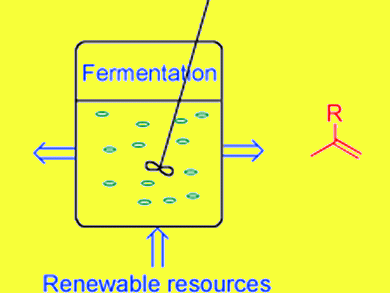Pablo Domínguez de María, Aachen University, Germany, highlights ways in which enzymes can be used in white biotechnology applications. The use of biological natural cycles—and de novo-designed pathways—represent an efficient and sustainable way to produce platform chemicals and commodities.
Domínguez de María finds that the key for the bioproduction of low-added-value compounds is the holistic understanding of microbial metabolism (“metabolic engineering”), coupled with efficient integration between fermentation and downstream processing, to keep sustainability, efficiency, and cost at the right level.
An example is the heterologous host (Escherichia coli) which was engineered to produce, de novo, alkene precursors (β-hydroxyalkanoates). This approach is expected to achieve a productivity of 2 galkeneL–1h–1, with a carbon balance of 0.66 (from glucose) after optimization. At the bulk level, the estimated production costs of alkenes are in the range of 0.4–0.9 €kg–1 when glucose from starch or sugar cane is used as feedstock.
- Recent Developments in the Biotechnological Production of Hydrocarbons: Paving the Way for Bio-Based Platform Chemicals,
Pablo Domínguez de María,
ChemSusChem 2011.
DOI: 10.1002/cssc.201000306



